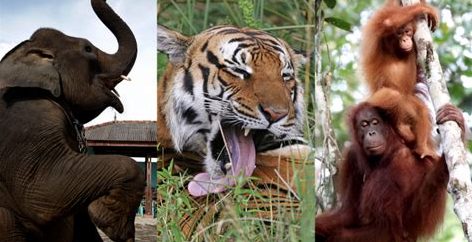- home

- Publication & Resources

- Blog
- NATURE IS INVINCIBLE, NOT EXTINCTION

NATURE IS INVINCIBLE, NOT EXTINCTION
Sudan, the last male northern white rhinoceros died this year in Kenya, leaving his species on the brink of extinction. According to the World Economic Forum(WEF) report, 19 animal species are critically endangered in the world including the South China Tiger and the Orangutan.

By Prerna Lall
Interns – CASA Communications
In the last decade, Western Black Rhinoceros and Pinta Island Tortoise have disappeared from the earth. More than 26,000 species are threatened with extinction, that is more than 27% of all the assessed species by the International Union for Conservation of Nature (IUCN).
 India, a megadiverse country with only 2.4% of the world’s land area, accounts for 7-8% of all recorded species, including over 45,000 species of plants and 91,000 species of animals. As per the quantitative evaluation done by the IUCN, there are 57 critically endangered species of animals in India including the Gyps vulture, Indian Tiger and Olive Ridley Turtle.
India, a megadiverse country with only 2.4% of the world’s land area, accounts for 7-8% of all recorded species, including over 45,000 species of plants and 91,000 species of animals. As per the quantitative evaluation done by the IUCN, there are 57 critically endangered species of animals in India including the Gyps vulture, Indian Tiger and Olive Ridley Turtle.
It shouldn’t come as a surprise that a major cause for species extinction is human beings. We love animals only to pet and poach them for our pleasure. Habitat loss, degradation, fragmentation and hunting are the greatest eliminators of terrestrial species. Deforestation happens so rapidly that the species do not have time to adapt to their “new forced environment” and are lost in the process. Studies estimate that 25% of the world’s current animal and plant species could be gone by 2050, and 50% could be gone by the end of the century with the current extinction rate.
How does species extinction bother us? When the American Bison got extinct, the entire tribe in the United States which was dependent on it had to shift their existence for survival. We live in an ecosystem, an environment where species depend on each other for survival. When a species gets wiped off the planet, it upsets the balance of nature. It will take at least 5 million years for speciation to rebuild the biodiversity we are likely to destroy during this century, indicates a study.
India realised the importance of conserving the environment in 1865 with the introduction of the first Indian Forest Act. Since then several policies have been adopted by the Government of India including The Wildlife (Protection) Amendment Act, 2006 and National Wildlife Action Plan (2002-2016). In order to protect endangered animals in India like the Indian tiger and the Gharial, the government implemented projects like Save the Tiger and Crocodile Conservation Project.
In whatever way we may look at this, animal extinction touches us, not forgetting that we are also animals. We cannot pretend or rather ignore species extinction, yet our actions and activities do contribute towards it. If we don’t address this problem seriously then we are going to be victims of this extinction that we’re at fault for.
Image source: www.ibtimes.co.uk
 Previous Blog Post #MeToo #TimesUp – The 21st Century Women Mutiny
Previous Blog Post #MeToo #TimesUp – The 21st Century Women Mutiny Filariasis: Battling Superstition WITH CARE
Filariasis: Battling Superstition WITH CAREFeatured Post

International Women’s Day -2021
8 Mar 2021
International Women’s Day -2021 is very special for CASA. It’s a delight to announce, CASA with the support of the Church of Sweden has launched an exclusive Gender Desk to emphasise the importance of Gender Justice work. CASA has been working for Gender Justice all throughout and across our constituencies in all these years. Gender Desk comes to add vigour […]

Overcoming Gender and Poverty Barriers
Poverty has been an inevitable problem in India since the beginning of time. The increasing problems of poverty caused by overpopulation and the unequal distribution of wealth among the people have led to a huge impact on the life of millions in the rural as well as the urban area. A person has to acquire […]

Impact of Climate Change on Women
16 Jan 2021
Climate change is a prevailing problem globally whose hazardous repercussions extend beyond the environment. Shrinking glaciers, extinction of plants and animal species, mutation, rise in the Earth’s average temperature and triggered seasonal fluctuations, are some of the impacts of climate change that have already grabbed the headline. Certain early predictions pertaining to climate changes had […]



